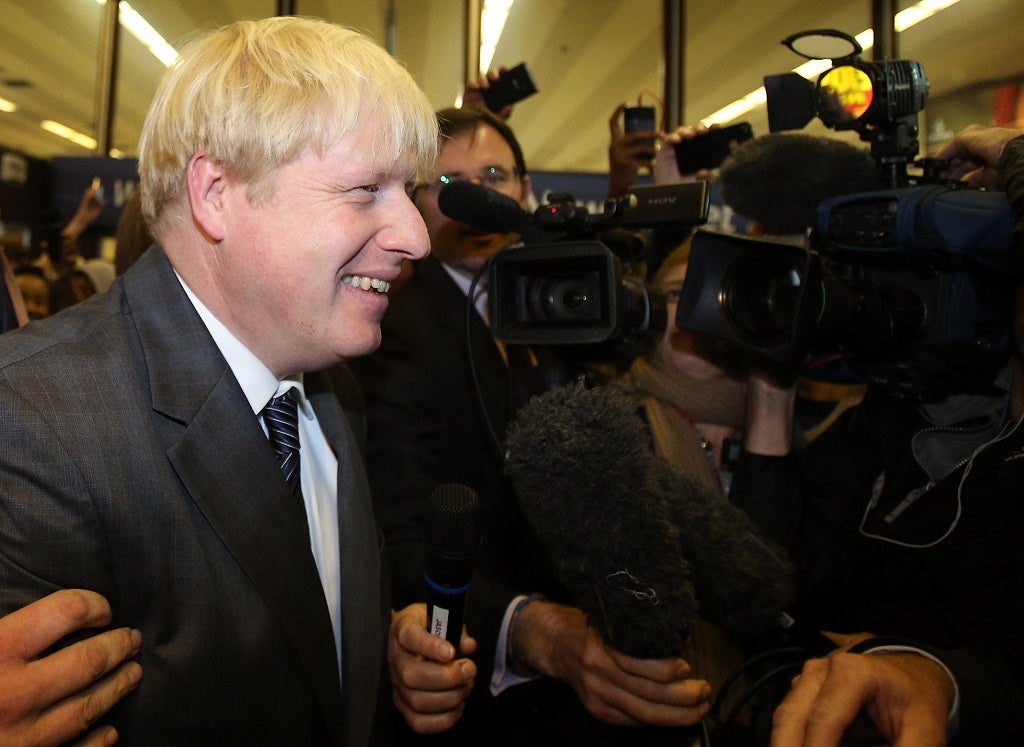Hero-worshipping Boris Johnson distracts this Tory conference from the party's deeper problems
Our Chief Political Commentator reports from a party conference where, once again, the base is unhappy with its leader, modernisation and the public sector


Coming to a Conservative conference now is not very different from attending the annual gathering in the mid to late 1990s. To the credit of successive leaders, there are more young people, women and ethnic minorities. But the passions are the same: Europe, a smaller state, a deep conviction that the only effective mediating agency for the delivery of services is the private sector. The biggest cheers are for speakers talking of benefit cuts. If anything, the sprinkling of One Nation Conservatives has declined since the epic election defeat of 1997.
Although the last Conservative Chancellor, Ken Clarke, tours the fringe meetings to argue that this is a government of One Nation Tories, he would not have been as dismissive of Ted Heath as George Osborne was in his address yesterday. The current Chancellor repeated the simplistic orthodoxy that while Heath “buckled” in 1972, Margaret Thatcher pressed on triumphantly in 1981. Nor would Clarke or indeed the current Business Secretary, Vince Cable, have singled out the venture capitalist Adrian Beecroft for high praise; the right wing de-regulator was cited by Osborne as he proposed a new deal in which workers become shareholders if employers could sack them without compensation.
This is a party that remains rooted on the right and yet unsettled by the electoral consequences of its ideological mission. As an additional complex ingredient, while the leadership shares quite a lot of the activists’ right-wing instincts, at least in relation to the state, the party is still made uneasy by compromises forced upon the self-described “low tax, small government” Osborne and his friend David Cameron. The once natural party of government remains troubled by the expedient demands of power as it has been, in and out of office, since the mid 1990s.
The clearest echo of the 1997 conference, the first after it lost power, takes the form of near worship of a figure that arrives as a visiting god. The idolatry, the yearning for a leader to take them to the Promised Land is the most vivid illustration of a party that continues to be impatient with pragmatic calculation. It prefers the excitement of an ideological crusade and the ecstatic thrill of kneeling unquestioningly at the altar of a hero. Now the hero is Boris, unblemished by the burdens of cabinet government and the compromises of coalition, safely detached from the seething tensions within the Conservative parliamentary party and between the two ruling parliamentary parties. At the 1997 conference, it was Michael Portillo, defeated at the election but who came to be among them in Blackpool for 24 hours. He spoke at a fringe meeting that was so packed that the breathless audience could not all be crammed into one of the biggest venues.
In both cases, what their heroes were saying did not matter very much. By the autumn of 1997, Portillo had begun his journey away from the evangelical right. At previous conferences, his collected speeches were bought at gatherings of the “No Turning Back” group as if they were the bible. But by the time he arrived in Blackpool, he looked and sounded uncomfortable. His speech was largely vacuous. It appeared as if he would prefer to be anywhere else in the world. The adoring crowd did not notice. They emerged ecstatic. They needed a hero and he was their chosen one. Already they were bored or uneasy with their new leader, William Hague, with his baseball cap and his visit to the Notting Hill Carnival.
The parallels are not precise. There is nowhere Boris would prefer to be than the Conservative conference now, among the adoring throng during his 24-hour visit. But the aching for a hero and wariness of the party leader are the same. Similarly, the activists are not listening very carefully to Boris just as they had ceased to listen to the disillusioned Portillo. At different times, Boris has called for an “earned amnesty” for illegal immigrants, argued for Keynesian investment in London and now vaguely acts as a defender for the “squeezed middle” as if there was a wand to wave. He knows there is no wand. One example Boris gave yesterday of the ignored burdens on the middle classes is the cost of travelling to work. Yet in his election campaign, he had no choice but to defend astronomical Tube fares in London. The detail does not matter. Boris has not had to concede ground to those lefty Lib Dems. He is popular. He is witty. He will take them to the Promised Land.
In Osborne’s renunciation of a moderate Tory Prime Minister and the yearning for a hero, the Conservatives are closer to Labour in the 1980s when Tony Benn aroused a level of fervent idolatry comparable to Portillo in the 1990s and Boris now, and when former pragmatic leaders were dismissed in platform speeches. They are symptoms of a disturbed party, one struggling to adapt to changing times. The Conservatives still await their modernising moment.

Join our commenting forum
Join thought-provoking conversations, follow other Independent readers and see their replies